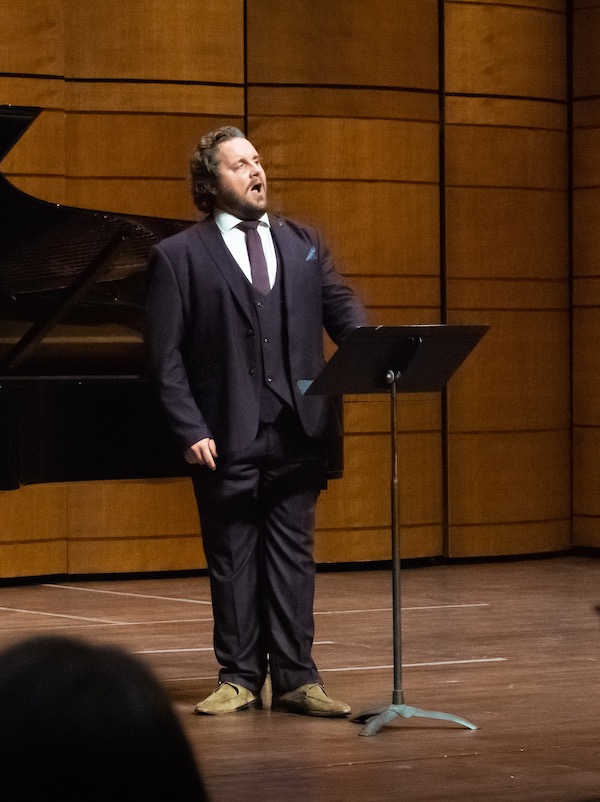Michael Spyres ranges widely, masterfully in Vocal Arts DC debut

Michael Spyres opened the season for Vocal Arts DC Monday night. Photo: Courtney Ruckman
Although voice types might seem fixed and clearly defined, there are singers who straddle classification divides or who shift from one to the other over the years.
Vocal Arts DC opened its season of noteworthy song recitals with one such unclassifiable voice, American tenor Michael Spyres, at the Kennedy Center Terrace Theater on Monday night.
General director Peter Russell dedicated the Vocal Arts season to the late Daniel B. Silver, the organization’s long-time president. One fervently hopes that the presenter, which has shortened its season to just five concerts, will be able to rebound fully from the pandemic in future years.
Spyres has a strong enough low range to sing some of the baritone repertoire, a trait that led him to release his debut recording under the title “BariTenor.” At the same time, his high range is extensive and strong enough that he has sung the roles of Tristan and Idomeneo, the latter currently on the stage of the Metropolitan Opera. The program for his Washington debut, accompanied by pianist Mathieu Pordoy, showed off many facets of his remarkable voice.
Spyres has recorded the first work on this concert, Berlioz’s Les nuits d’été, in the original keys for a future release. It is rare enough these days to hear a man sing this piece, but to be able to hear it without the normal transpositions up or down is even rarer. Spyres pronounced the French poetry of Théophile Gautier with impeccably clear and fluent diction. (For his work in France, the French government named Spyres Chevalier des Arts et des Lettres last year.)
The first song, “Villanelle,” moved at an easy-going pace, with Pordoy bringing out echo lines in the piano part. In “Le spectre de la rose,” Spyres dipped more into the baritonal range, with heroic valor at the climax of the song (“J’arrive du paradis!”). He shifted yet again to a controlled softness for the tender conclusion. “Sur les lagunes” had a similar surprising mixture of dark timbre, full-throated anguish, and a floated top range at other points.
Each statement of the opening line of “Absence” (“Reviens, reviens, ma bien-aimée”) had a strikingly different character: tender and soft, with striking crescendo and decrescendo, or in ghostly head voice, all with flawless intonation and shifts between registers. More of the tenor’s lyrical side came out in the fifth song, rather simple but given subtle shading by both singer and pianist. A return to full volume made the sixth song a rousing conclusion.
From his studies in Vienna and his work in German opera houses, Spyres sang just as convincingly in German. He and Pordoy gave a fluent, spacious rendition of Beethoven’s An die ferne Geliebte, generally considered the first song cycle. Pordoy helped drive exciting accelerations in the first song, a rash sort of fever that is calmed in the second song. Spyres and Pordoy took this pastoral idyll at a placid pace, giving variety even to the section where the singer harps on a repeated note (“Dort im ruhigen Tal”).
Again both lyrical and heroic sides of Spyres’ voice returned, switching gears effortlessly between the tender fifth song and the outbursts of the final song. With impressive breath support, Spyres could spin out long phrases, the voice revealing no sense of strain. The willingness to take the last song at a slow tempo allowed the musicians to draw out the last bit of sentiment from the poetry.
In its choice of repertoire, this recital was a paean to the overwhelming power of love in all its forms. To this mix Pordoy added Liszt’s L’idée fixe (“Andante amoroso”), one of the composer’s admiring reworkings of Berlioz’s Symphonie fantastique. A variation on the melody that pervades that work, representing romantic obsession, the piece gave Pordoy a few shaky moments in its most virtuosic passage, where the florid right-hand part was not always on the mark.
After Spyres the baritone and Spyres the lyric tenor came Spyres the Italian operatic tenor, in a blockbuster rendition of Liszt’s Tre sonetti del Petrarca. With a much broader vibrato, Spyres left no doubt as to his high tenor bona fides, taking both of the “ossia” vocal lines up to high D-flat in “Pace non trovo.” The second one, on the climax of the song (“O Laura per voi”), rang with authoritative force as Spyres stretched the phrase.
The set was not entirely without its subtleties, however, as on the velvet chromatic scale weeping downward from high A-flat in the second song (“e le lagrime”), followed by more heraldic top notes. Pordoy and Spyres together brought out the sweet side of the final song, with a dulcet pianissimo tone from the tenor (“Tanta dolcezza”) and some music-box interludes from the pianist.
For the encore, the duo remained in the world of Italian opera, at least as conceived by a young Austrian composer. From Mozart’s Idomeneo, Spyres gave his interpretation of the Act II showpiece “Fuor del mar.” Add to the list of astounding feats in the Spyres arsenal the rippling runs of a Mozart lyric tenor.
Mezzo-soprano Rihab Chaieb and pianist Brian Zeger perform Schumann’s Maria Stuart-Lieder, Ravel’s Chants Populaires, and other songs 7:30 p.m. December 8. vocalartsdc.org


Posted Oct 11, 2022 at 12:44 pm by JackFirestone
Just last week in addition to his triumph as Idomeneo at the Met, Spyres “Baritenor” recording received the Gramophone vocal recording of the year and in 2018 Gramophone awarded his Les Troyens with Joyce DiDonato and John Nelson, conducting the Best Recording of the Year.
Spyres is a talent to be reckoned with. His career has mostly been in Europe, but with the success of Idomeneo at the Met and Romeo in Houston, hopefully we will hear more of him on this side of the pond.
Posted Apr 02, 2023 at 7:18 pm by Mel P Eisenberg
He would be a resounding success in ANY of the several “Golden Ages of Opera”. I have been attending and listening to opera for 75 plus years now and he is unique and belongs at the top of the triangle with Bjorling, Caruso, Gigli, Melchior and Wunderlich. His wife is also an excellent soprano. Live long and prosper Michael and family.